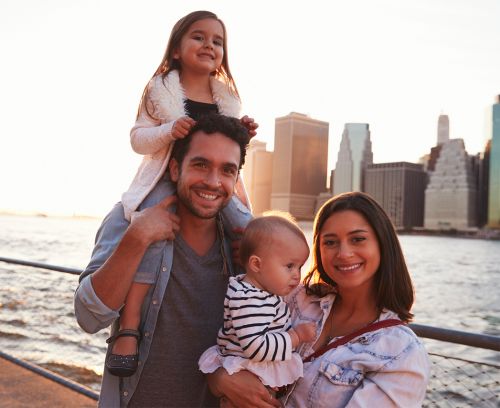The thought of undergoing an interview, any interview, for just about anything, gives most of us anxiety. For marriage-based immigration clients it's no different. If you’re anxious, sweaty palmed and would rather lose a toe if it could get you out of going to your interview with an immigration officer, this article is for you. It will shed some light on what you should expect, and will cover some of the questions you may encounter. There's no template for an interview. No set questions an immigration officer must ask you. The government officer will run the show. But most officers will follow a similar pattern. This article is not a replacement for a qualified experienced immigration attorney by your side on the day of the interview. I would not recommend count pennies when it comes to hiring lawyers. A good lawyer is usually worth what you paid for them. Let’s get into it.
Don’t Be Late, Okay?
Your appointment notice will identify the address of your local USCIS Field office where your interview will be held. If you haven't been to that USCIS Field Office before, take a drive the weekend prior to your interview and see where the building is located so you know exactly where you’ll be going on the day of the appointment. Making this test-run prior to the interview date can also help relieve some anxiety on the day of the interview.
Other lawyers may do things differently so you should follow the directions your attorney gives you for the day of the appointment, but this is how I do it. I always ask clients to reach the USCIS Field Office an hour before the interview start time. That provides enough time to find parking, get through security, run to the restroom if they need to, and also leaves some time for unexpected traffic delay. Don’t try to check-in. They won’t let you check-in that early anyway. I ask clients to clear security and take a seat in the waiting area. In the event that someone asks you what you’re doing, tell them you’re waiting for your lawyer. Don't let anyone force you into checking-in until your attorney arrives.
I arrive at the Field Office about 40 minutes before the interview start time and immediately locate my clients. Yes, I am one of those people who insists on being on time. I am almost never late. I make sure I leave early, no matter where I am going. If I can do it, anyone can. Your lawyer should not be late or a no-show unless they have met with some tragedy, and neither should you. "There was a lot of traffic" isn't an excuse. Please leave your home early and that should help with any unexpected traffic. After greeting my clients, I proceed to help them check-in so we can begin waiting to be called for an interview.
And Now We Wait!
Much of your time at the USCIS Field Office, especially in more populated cities, will be spent waiting for you to be called for the interview. You may find yourself waiting between 30 minutes to well over an hour. If your lawyer has done their homework, there shouldn’t be a whole lot to talk about while you wait other than mostly small talk. I always have a pre-interview meeting with my clients about one week before the interview day (either in my office or over the phone). At that meeting, I can address any questions or concerns my clients have so they aren’t panicked the day of the interview, and they know exactly what to expect. If your lawyer doesn’t follow a similar procedure, ask them to. My clients find it helpful, and so do I. The waiting area at a USCIS Field Office isn't a private setting, so you want to limit your discussion of sensitive matters in such an environment.
Getting Called Up.
You’ll be called up for the interview either by a number on a ticket or by your name. The name they will call is the I-130 beneficiary’s name/I-485 applicant’s name., i.e., the person applying for lawful permanent residence (a green card). The immigration officer who calls you up is almost always the officer who will conduct your interview. The officer will escort your lawyer and yourselves (the married couple) to their office. If one of you is unable to communicate in English, you will need to take a translator with you. USCIS will not provide a translator for you. Neither the petitioner nor your lawyer can be the translator. Even if the immigration officer speaks your mother tongue, they will not conduct your interview in a language other than English.
The individual officer's room will be fairly small in size. It’s usually roomy enough for 4 to 5 adults but anything more than that and it will feel cramped.
There will be 3 to 4 chairs in the room in front of the officer’s desk. If the officer wants your attorney to sit next to you or behind you, they will direct your lawyer according to their preference.
First thing you’ll do before taking a seat is show your passport or driver’s license and take an oath to swear to tell the truth, the whole truth etc.
Once seated, the officer will begin the interview. If there is something I need to clarify or update the officer on, I tend to do that now, just before the officer gets into their routine. Your lawyer may do it differently.
The Interview.
The immigration officer adjudicating your case may have established their own way of doing things, especially if they are experienced. Newer officers can be more rigid in their approach and appear to be following a script. Whether you’re interviewed by an experienced officer, a new one or someone in between, there will be similarities in their methodology.
Some officers will start by confirming the details submitted in the Form I-485, such as biographical information, assessing for inadmissibility and security concerns. Others will start by asking how you (the couple) met. This isn’t something you should have to rehearse. However, during consultations with clients I have experienced couples who have differing recollections of how they met or where they went on their first date. You don’t have to be deliberately trying to deceive the government to make them think you’re deceiving them. If you don’t have your facts straight, it can give the impression that you are being less than truthful. So, make sure you both know the facts of your case. Both of you should be able to describe how you met; who asked out whom; when you met; where you went on your first date; who paid on the first date; where you went on your second and even third dates. The first few dates in any relationship are so important that they aren’t quickly forgotten – most people will remember details about them. Both of you should be able to talk about your wedding, and whether or not you went on a honeymoon. You should know your marriage date - “I don’t remember” isn’t an acceptable answer here, and neither is mixing up dates. Couples often laugh about these things in private conversations when one partner doesn't remember anniversaries, birthdays, etc., but trust me on this, it's not cute in this venue. Not knowing your spouse's birthday may get you a laugh with friends, but it's not funny when you're being interviewed by the U.S. Government. You should know details about each other, and be able to comfortably talk about those details, such as where each of you work and how much money each of you brings home every month. The officer may ask where you live, and who pays the bills. If the officer has reason to believe either of you are not being honest, things will become far more uncomfortable and adversarial. You may find yourselves undergoing a fraud interview in which the officer asks one of you to step out of the office while they ask the other one questions about your relationship. After, they will have you come back in for questioning and ask the other spouse to step outside. If the answers match up, good. If they don’t, you’re both in for an unpleasant drive home.
Whatever you do, tell the truth, and take a lawyer with you. Don’t just hire a lawyer to go with you to the interview. Hire an experienced immigration attorney from the start of your case. I've heard some people say that honest people don’t need lawyers. They’re wrong. Honest people get into trouble all the time. You hire a competent immigration attorney to keep you out of trouble, and help protect your rights. However, if your lawyer is doing a lot of talking at your interview, things may not be going too well. If I've done my job before we even get to the interview, I don't need to say a whole lot at the interview. I will be listening carefully to questions asked and answered, and interrupting only if I need to.
Best of luck.
For general tips on immigration related interviews, check out our: 10 Top Tips for Interviews with USCIS or Consular Officers.
Sunil C. Patel is an experienced immigration attorney and himself a first-generation immigrant. Formerly a managing attorney with a multinational immigration and corporate law firm, he now focuses his practice exclusively in immigration law at his own law firm, Sunil C. Patel Immigration Law, LLC. To schedule a consultation, please call (770) 756-6056 or visit www.sunpatlaw.com. You can also schedule an appointment by selecting an available time on his calendar.



